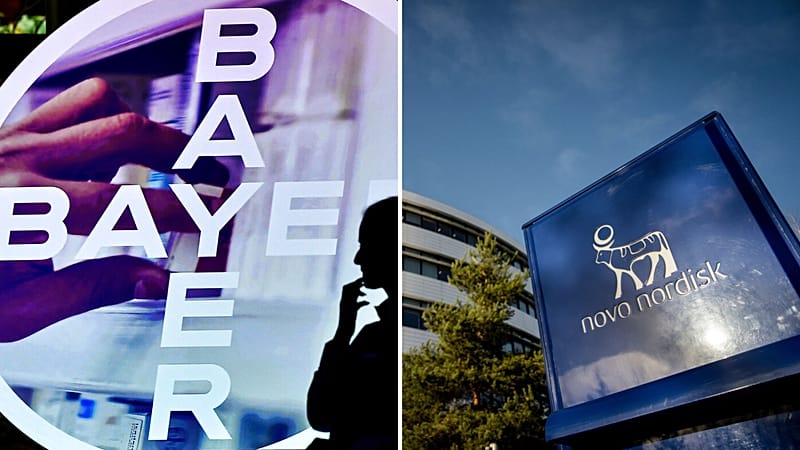Pharma market shake-up: Bayer jumps, Novo Nordisk sinks 10%

Shares in the Danish pharmaceutical giant Novo Nordisk fell by 10% after the drugmaker announced its oral semaglutide failed to show benefits in slowing the progression of Alzheimer’s disease.
Semaglutide, the active ingredient in Novo’s blockbuster diabetes and weight loss drugs Ozempic and Wegovy, was tested for two years in phase 3 trials, involving 3,808 adults with early signs of Alzheimer’s disease, to see its effects compared with a placebo.
“While treatment with semaglutide resulted in improvement of Alzheimer’s disease-related biomarkers in both trials, this did not translate into a delay of disease progression,” the statement reads.
Following the global popularity Novo Nordisk’s injectable obesity drugs, hopes for another breakthrough product — in this case, for the treatment of Alzheimer’s — fuelled a previous jump in the share price.
The illness affects millions worldwide, and it has long posed a challenge for drug developers, with many promising approaches failing to translate into meaningful clinical benefits.
In tablet form, semaglutide is sold under the brand name Rybelsus and is used to treat type 2 diabetes. Semaglutide belongs to a class of drugs known as GLP-1 and it has been shown to have positive effects on the body — unrelated to diabete — such as in lowering general inflammation levels.
The setback dealt a blow to hopes that GLP-1 treatments, which have transformed the market for obesity and diabetes therapies, might also offer protection against neurodegenerative diseases.
Novo Nordisk said it would review the findings but emphasised that the results do not affect the approved uses of the drug for diabetes and weight management.
Martin Holst Lange, chief scientific officer and executive vice president of Research and Development at Novo Nordisk, said, “While semaglutide did not demonstrate efficacy in slowing the progression of Alzheimer’s disease, the extensive body of evidence supporting semaglutide continues to provide benefits for individuals with type 2 diabetes, obesity and related comorbidities.”
Due to the lack of clinical benefit, the planned one-year extension of the trials will be stopped.
Bayer is back
Bayer AG's shares jumped by more than 10% after the German drugmaker said in a statement that its experimental stroke-prevention drug showed positive results.
On Sunday, Bayer announced that its new experimental drug, Asundexian, worked well in a major Phase III study called OCEANIC-STROKE, involving 12,300 patients.
The drug, taken once a day along with standard antiplatelet therapy, significantly lowered the risk of another ischemic stroke in patients who had recently had a non-cardioembolic stroke or a high-risk mini-stroke.
The statement highlighted that the treatment worked without increasing major bleeding, a common concern with blood-thinning treatments.
"Stroke is the second leading cause of death globally, and recurrent ischemic strokes tend to be more disabling and carry a higher mortality risk than the first stroke," said the statement.
Experts involved in the study say Asundexian could become an important new option for preventing recurrent strokes.
Because of the strong results, Bayer plans to submit the drug for approval worldwide.
Today

